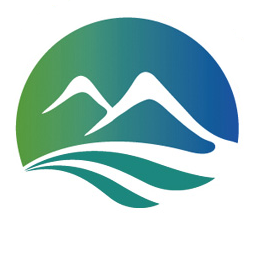Review of adaptive governance (AG) research in small islands: Critical dimensions and future directions
Abstract
Adaptive governance is increasingly known as a salient factor in enhancing capacity particularly in sustainable development in small islands. Considering how small islands are vulnerable to changes, it is important to determine how islandness influence both social and ecological components of a socio-ecological system and what are the various types of governance contexts in islands that are existing in literature. With that aim in mind, we conducted a systematic review of adaptive governance research in small islands based on 43 peer-reviewed articles. We generated research clusters and gaps based on content analysis and examine the key dimensions where adaptive governance principles are used or adopted. Our main findings include: dominant research field (i.e., island resource governance, climate risk governance), adaptive governance dimensions (i.e., governance structure and framework, stakeholder capacity, planning and development), scale/level of research, most common methodologies (questionnaire survey, interviews, and group workshops, mixed methods, action research) and most frequent typology of risk (climate change, variability and impacts). Based on the result, future directions for adaptive governance research in small islands are identified—most of which covers stakeholder characterization and clarification of the diverse set of actors and capacities that support implementation of adaptive governance in multiple scales and processes. Furthermore, in-depth analysis of the present and future risks and uncertainties in small islands, coupled with cross-scale linkages, are needed. Finally, we recommend that island’s geographical and cultural contexts be considered in institutionalization of adaptive governance principles and approaches in small island settings.
Keywords
adaptive governance, islandness, small islands, systematic review, content analysis
Introduction
Small islands are very sensitive to change. According to the IPCC Assessment, small islands are increasingly affected by increases in temperature, growing impacts of tropical cyclones, storm surges, droughts, changing precipitation patterns, sea-level rise, coral bleaching and invasive species (IPCC, 2022). Adding to these changes, small islands have small land area and therefore, natural resources such as, for example, freshwater resources, can be limited if demands and use are not aligned with carrying capacity. Moreover, humans living on islands tend to rely heavily on marine resources indicating that island size does not necessarily matter in elucidating human livelihoods but the distribution of subsistence items whether they are on land or sea (Keegan et al, 2008).
Since small islands are mostly remote from the mainland, they are usually characterized with high landscape, seascape variation and biological diversity (Fernandes and Pinho, 2017; Foley, 2018), and a high proportion of biodiversity and endemism which makes them subjected to a protection status by way of national policies and local rules (Weigelt, et al, 2013; Mouillot, et al, 2020). On the other hand, the “islandness” or the characteristics of small islands related to boundedness, smallness, isolation, and littorality has influenced vulnerability and resilience (Kelman, 2020) and if coupled with strong social capacity, can enhance local adaptive capacity.
Local communities in islands have a long-term relationship and dependency with nature and island ecosystems, and this relationship is usually reflected in local knowledge systems, culture, and traditions (Nunn, 2001; Nunn, 2003; IPCC, 2014). However, since they have faced various environmental changes over time and socio-economic changes altered the balance of human intervention to nature, challenges on governance and future island sustainability exist (Ortiz, et al, 2023). This includes the mismatch among resource use, conservation, and economic development resulting in the weakening integrity of the system to continue to support human needs and the decreasing social-ecological resilience in island communities in these uncertain times (Lorilla, et al 2019).
Given the unprecedented local and global changes, it is important to determine how “islandness” influence both social and ecological components of a socio-ecological system and what are the various types of governance contexts in islands that are existing in literature. With that aim in mind, we conducted a review of literature on adaptive governance focusing on islands and analyzed the factors that enhance and constrain adaptive capacity of the socio-ecological system. We also generated research clusters and gaps based on empirical evidence and examine the key dimension where adaptive governance principles are used or adopted.
Definition of islandness
Small islands deal with multiple hazards and timescales and illustrate the dual adaptation policy and planning challenge against cyclical climate extremes and slow onset changes (e.g., shoreline gradual retreat and sea-level rise), while at the same time addressing development needs (e.g., job creation, economic activities, social well-being, etc.) and balancing adaptation activities across time scales (urgent action now and planning in the medium-to-long term) (Anisimov & Magnan 2021). In the context of geography or cultural studies, islandness could refer to a concept of cultural identity and experience that is tied to living on an island. This could involve aspects such as: (1) A sense of isolation or separation, due to being physically surrounded by water and separated from mainland areas; (2) A strong relationship with the sea and maritime activities; (3) A sense of community that arises from living in a relatively small, defined area; (4) Unique environmental and ecological aspects that come from being an island, such as specific flora and fauna, or geological features; (5) Potential vulnerability to environmental factors such as sea-level rise or severe weather.
With the complex interlinked issues facing small islands, integrating various constraints such as physical attributes, ecosystems, risk attributes and island culture is inherent to successful adaptive governance. Thus, governance scholars must closely examine areas where adaptive governance principles need to evolve to better suit a wide variety of governance contexts. In this study, we explore the examples of research work conducted in small islands with a focus on adaptive governance. We also analyzed and categorized the cluster of topics, the geographical setting, the types of risk, the governance contexts, as well as adaptive governance approaches applied and are available based on the empirical evidence.
Material and methods
We searched for scientific literature that covers adaptive governance and islandness in Web of Science Core Collection and Scopus databases. Below is a table that shows the string of command used for the literature search.
| Database | Platform | String of command* | Number of generated documents (n) |
|---|---|---|---|
| Web of Science Core Collection | Online | TI=("adaptive governance*" AND ("island" OR "islandness") OR AB=("adaptive governance*" AND ("island" OR "islandness") OR AK=("adaptive governance*" AND ("island" OR "islandness") | 48 |
| Scopus | Online | TITLE-ABS-KEY ("adaptive governance*" AND ("island" OR "islandness") | 23 |
| GRAND TOTAL | 71 |
Systematic literature reviews strive to "locate, evaluate, and integrate all pertinent research (regardless of design) to address a specific inquiry (or inquiries)" (Petticrew and Roberts, 2006). We used systematic literature and content analysis in synthesizing the current state of knowledge on AG and islandness. Figure 1 shows the paper screening procedure flow involved.
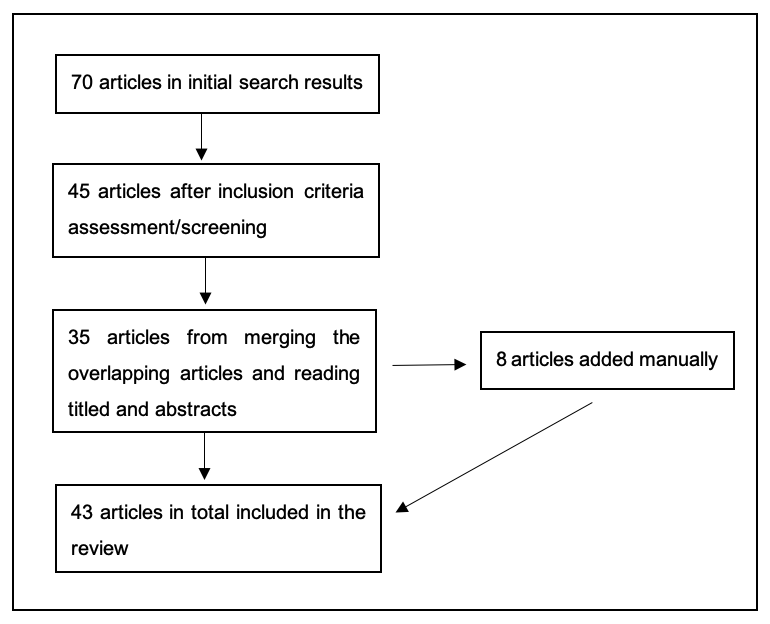
To begin the systematic review, a basic search was executed using the query "adaptive governance*" AND ("island" OR "islandness")" in both Scopus and Web of Science databases. This yielded 70 articles in total. We organized the literature by combining articles from both databases into a singular database, facilitating the removal of duplicates. Each article was reviewed and judged based on specific inclusion and exclusion criteria (Table 2). These criteria, rooted in descriptive attributes like the publication language and article type, as well as qualitative aspects (specifically, focusing on adaptive governance in small islands), were first applied to the article's abstract, title, and keywords, and subsequently to the full papers. This methodical approach enabled us to refine our selection to the most pertinent articles for our research. Ultimately, 35 articles were chosen for this review. Finally, 8 additional papers were added based on authors’ knowledge—with all of being considered relevant and were added during the analysis. We thus obtained a final sample of 43 publications (see Figure 1).
| Inclusion criteria | Exclusion criteria |
|---|---|
| In English | In language other than English |
| Empirical and theoretical (both single-case and comparative case studies) | Conceptual studies without empirical data |
| Peer-reviewed journal article | Other publication type than the peer-reviewed journal article |
| Mentions “island” or “islandness” in title or abstract or keywords | Not conducted in islands |
| Mentions “adaptive governance” in title or abstract or keywords | Purely social science or purely natural science research |
We hypothesize that AG research in small islands covers different types of ecosystems and scale-level of ecosystem and as a result, different levels of governance as well. We also assume that AG practices and approaches’ main intention is to promote adaptive pathways in managing common and multiple resources under system change. There will be risks and uncertainties and these variables have cause-effect and cross-scale processes that affect what type of governance practice and approached to be applied. Below is the conceptual framework of our review.
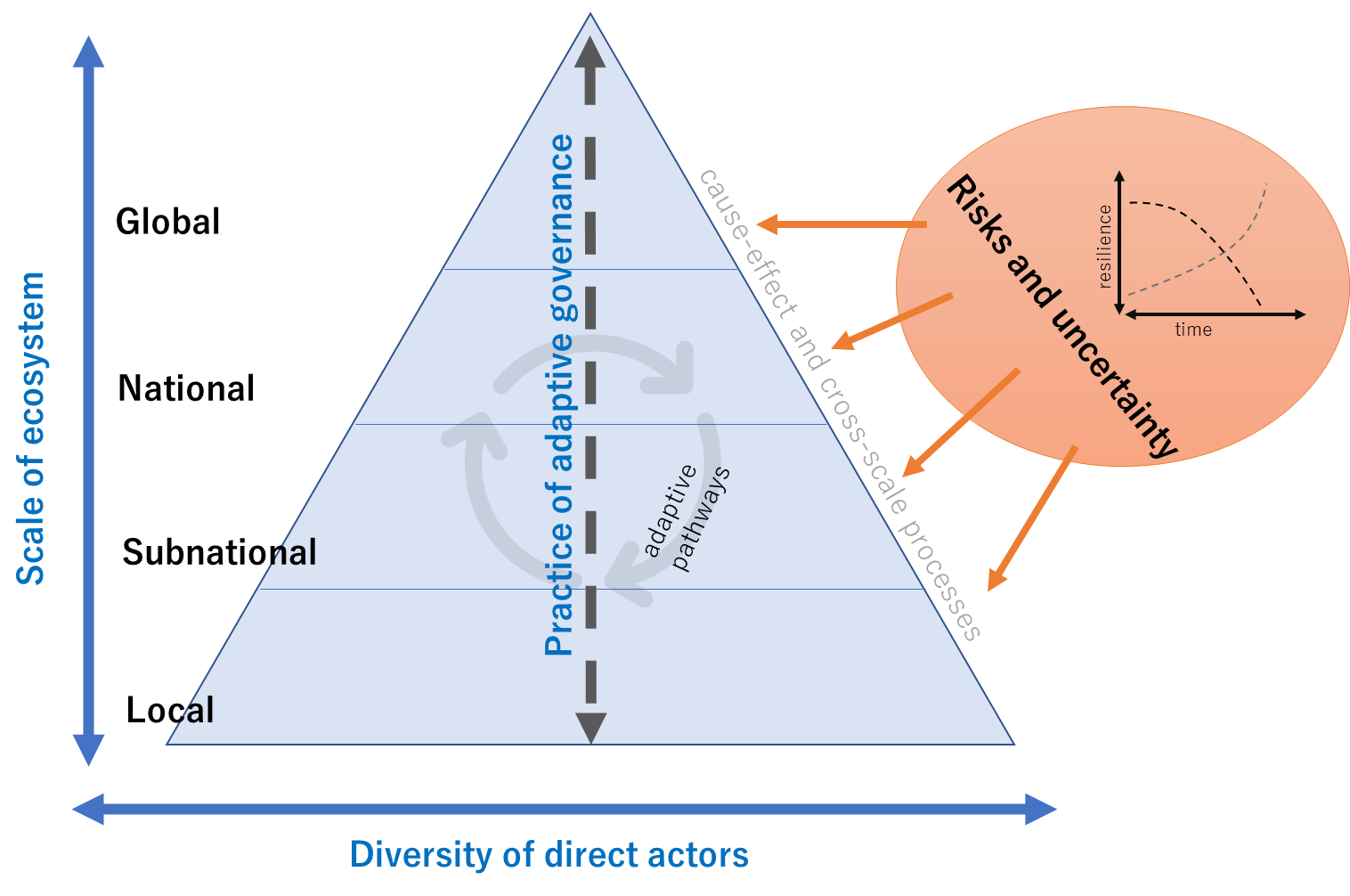
As it is also our aim to narrow down the dimensions of adaptive governance in the relevant literature, we created a set of definition to categorize the existing studies based on its key focus. The definitions are as follows:
- Stakeholder Capacity Dimension — this focuses on the assessment of island stakeholder's capacity, interest, social capital, network, and socio-demographic factors that are related to communities' internal characteristics and how it influences sensitivity to risks/changes and degree of impacts)
- Law and Policy Dimension — this focuses on the evolution and adoption of legislative foundation and measures (local, national or international rules, law and policies) that govern the conduct of human activities in islands
- Local and Indigenous Knowledge Dimension — this focuses on understanding local and indigenous knowledge and practices associated with island systems and culture that have been and are used by communities in islands in resource utilization and management and in predicting and adapting to risks/changes
- Governance Structure and Framework Dimension — this focuses on the institutional structure and implementation framework that determines the foundation/environment in which a governing body/institution/organization operates
- Planning and Development Dimension — this focuses on the development aspects of goals/targets/strategies and its associated policies in other domains, such as economy, finance, environment, culture, etc.
Additionally, we assume that adaptive governance approach will also be shaped by not only the social and demographic characteristics of the island but also the physical attributes of the island. For instance, oceanic islands, also identified as volcanic islands, are formed by eruptions of volcanoes on the ocean floor. Irrespective of their elevation, oceanic islands are termed "high islands." In contrast, continental and coral islands, even those that surpass the height of high islands by hundreds of meters, are referred to as "low islands" (Nunn et al., 2016). In this case, we also categorized the study area/site as to whether it is an oceanic or continental island.
In reviewing the articles, we keep in mind the following research questions:
- What are the cluster of topics included in the research of AG?
- What is the scale(s) of the research/study?
- What approaches (methodologies) were used/introduced in the research/study?
- What are the key dimensions of AG in small islands which were discussed?
- What are the research gaps that are existing in the topic of “adaptive governance and islandness”?
Results
Geographical and temporal distribution of studies
Most of the studies reviewed were conducted in Solomon Islands. This is followed by studies with multiple cases and conducted in the Pacific Island Countries (PICs) and the Small Island Developing States (SIDS). The characteristic type of island where the studies were conducted is mostly oceanic islands.
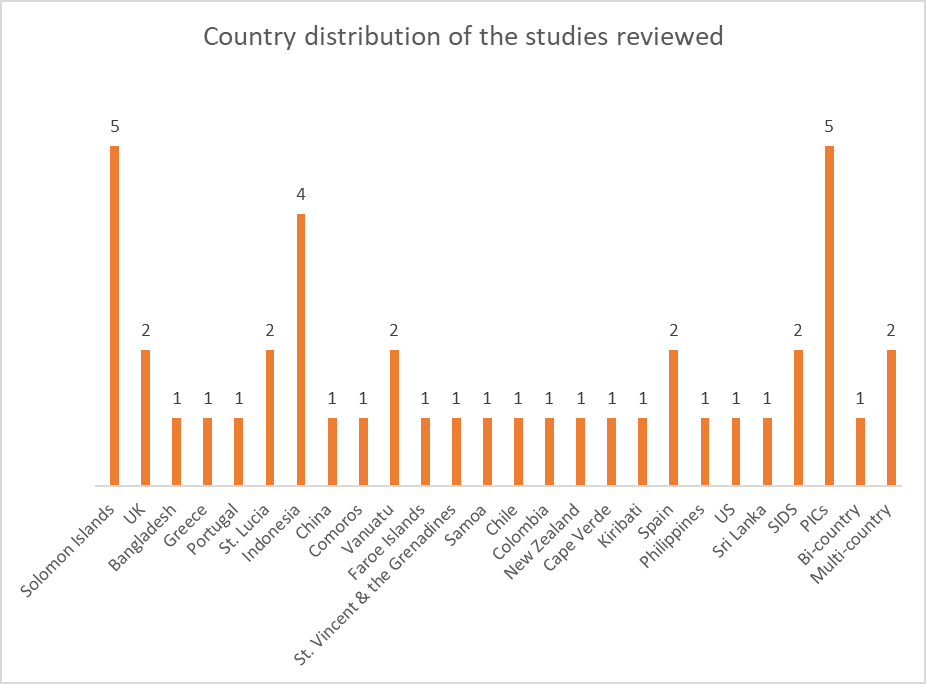
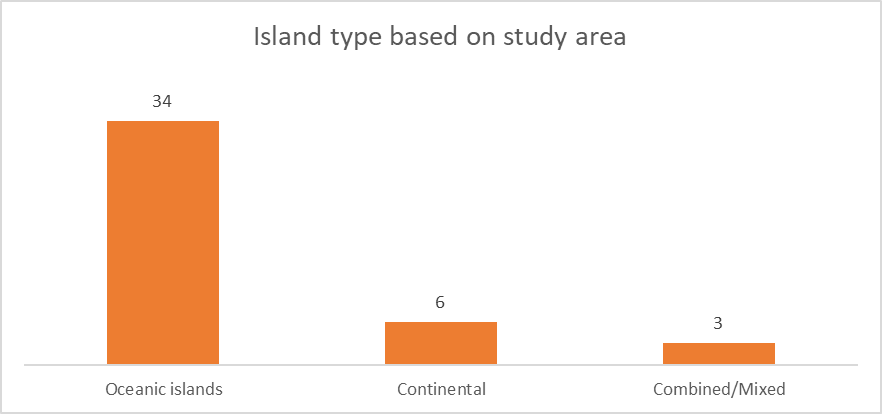
In terms of temporal distribution, majority of the studies were conducted in the year 2017 and 2022. Figure 5 shows the trend of publication of papers from 2008 to 2013.
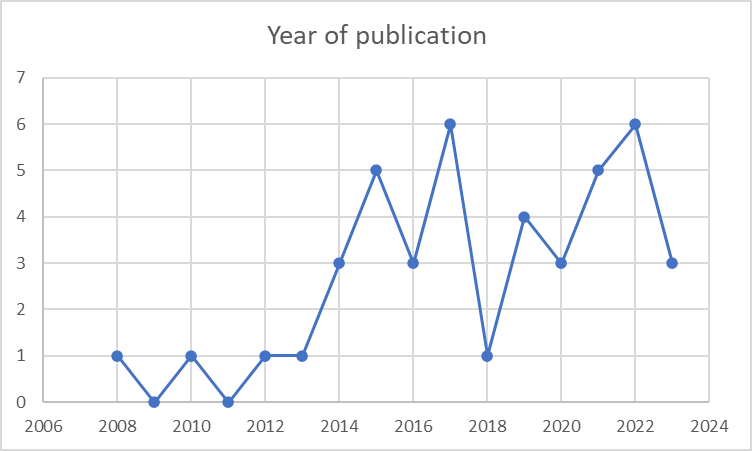
Thematic distribution of the research topics/field
Based on the 43 papers, we identified four research themes which were: climate risk governance (covering “vulnerability”, “risks”, or “impacts” brought about by climate change and the challenges of climate adaptation/governance), island resource governance (covering “integrative”, “holistic”, “multi-resource” planning and governance mechanisms) land/user rights (covering “local”, “customary”, and “traditional” systems of knowledge and use of resources); and marine and coastal systems (covering issues and challenges related to “fisheries”, “marine ecosystems”, and the “livelihoods/benefits linked with seas and coasts”). The most dominant theme reported by the studies reviewed is island resource governance, followed by marine and coastal systems, climate risk governance, and lastly, land/user rights (Figure 6).
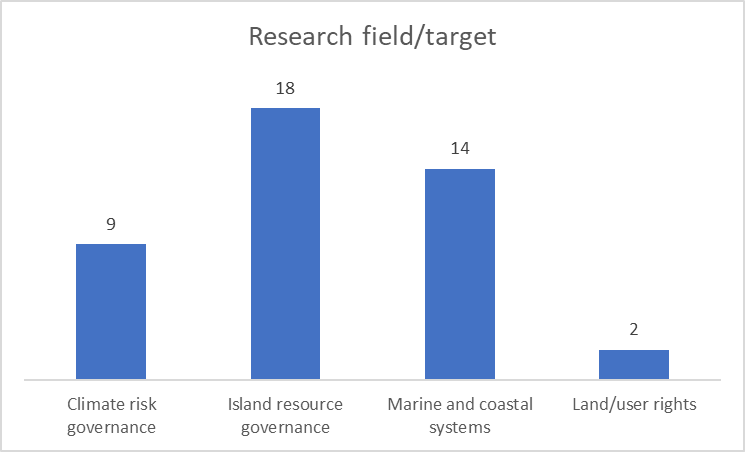
Moreover, based on the context of article content, we examine the five dimensions of AG which we have defined in our methodology. The most common AG dimension is governance structure and framework dimension (13 papers), followed by stakeholder capacity dimension (12 papers), and planning and development dimension (10 papers) (Figure 7).
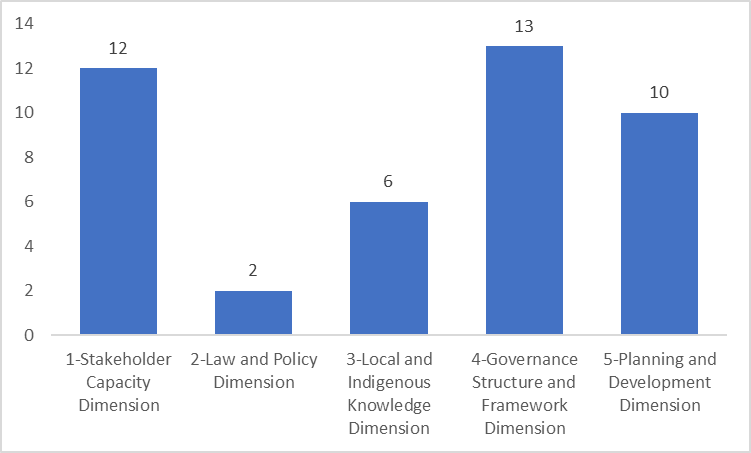
Further, the research methodologies used in the studies were analyzed and we identified seven types of methodologies, with “Questionnaire survey, interview and group workshop” being the most frequent type, followed by “Mixed methods”, “Action research”, and “Scenario planning/analysis”, respectively (Figure 8). More than half of the studies are implemented at the local level, and this is followed by regional or transboundary studies, sub-national-level studies, and lastly national-level studies (Figure 9).
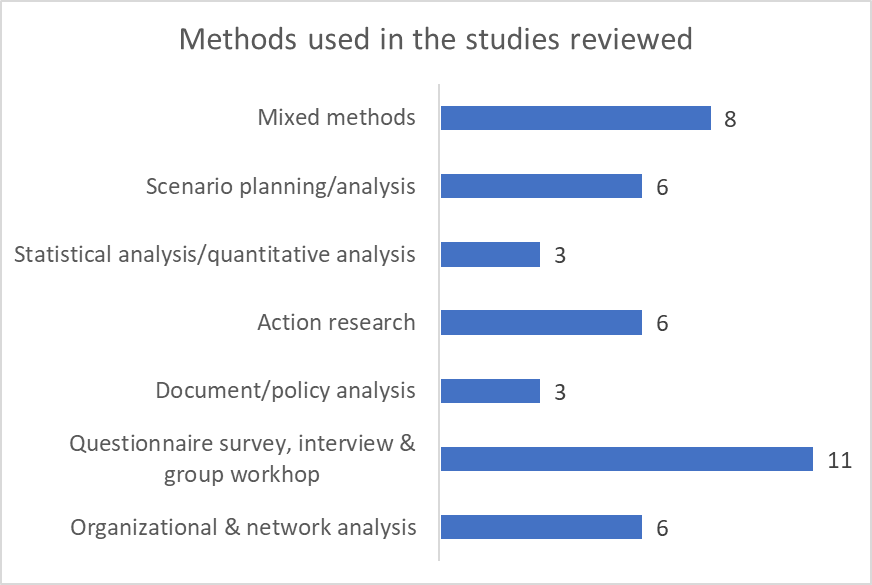
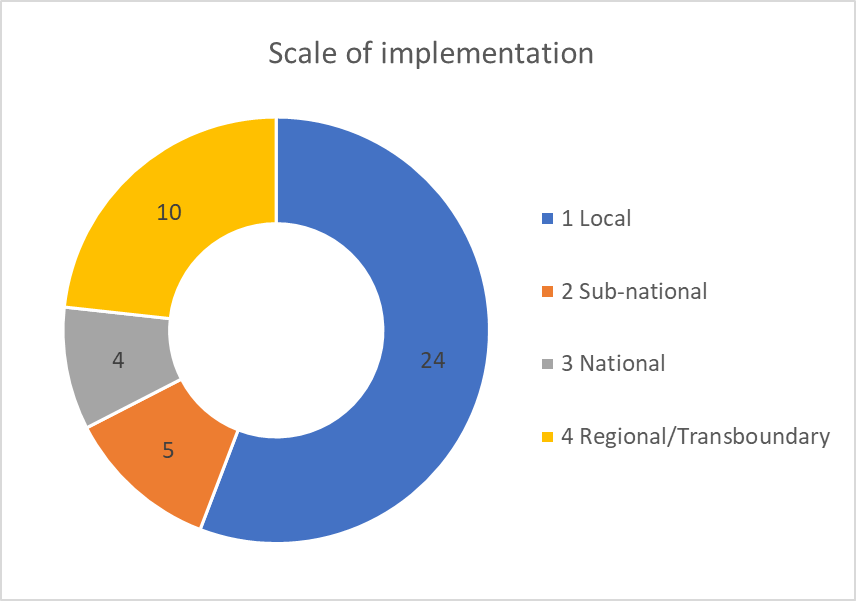
Specific themes based on resource type/context and cross-scale interactions
To provide more meaning on the broad research fields identified in Figure 6 and to determine where social-ecological interactions occur (what resource type, what level of cross-scale interactions), we analyzed the specific themes in the studies based on the resource type and/or context. Based on the result, many of the studies are focused on coastal and marine resources (i.e., marine ecosystems planning/management), and this is followed by climate-related topics (i.e., climate adaptation), risk and hazard (i.e., disaster management), and indigenous system (i.e., local ecosystem-based stewardship) (Figure 10).
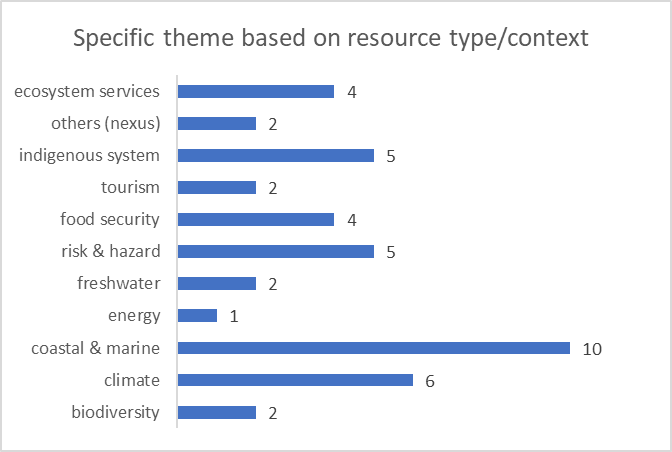
Diversity of actors represented in the studies reviewed
Based on the actors involved in the case studies reviewed, we characterized actor and stakeholder involvement and found diverse set of actors/stakeholders (Figure 11). The highest percentage represented is government (28%), followed by non-government organization/civil society (24%) and international organization (13%).
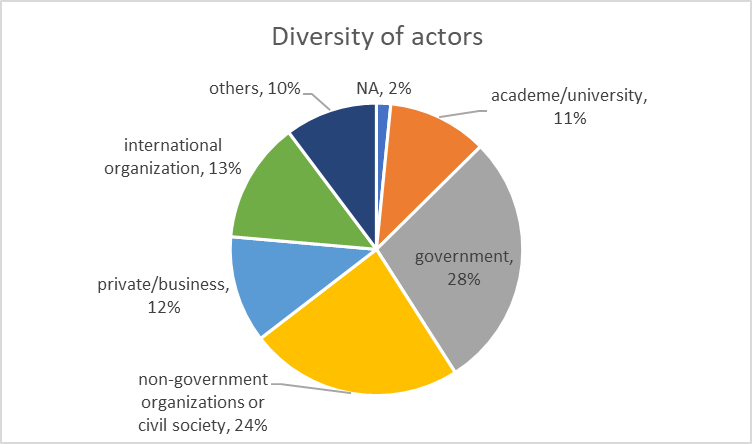
Categories and types of risks identified in the studies reviewed
There are three categories of risks based on origin which were identified in the studies reviewed and these are: (1) endogenous (internally-derived risks); (2) exogenous (externally-derived risks); and (3) combination of both endogenous and exogenous.
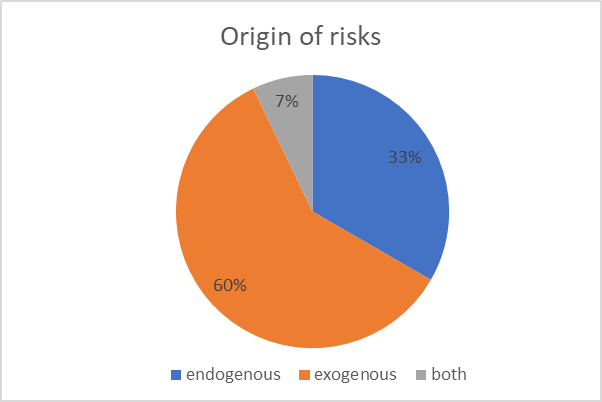
A large percentage of the studies (60%) dealt with exogenous risks or those that are brought about by external factors and not directly derived within the island setting. On the other hand, thirty-three percent of the studies indicated endogenous risks while 7% were represented by both exogenous and endogenous risks.
We also identified the specific island risks in the studies by generating 14 typologies of risk (Figure 13) and found that climate change and climate variability and related impacts is the most highly cited type of risk (9 papers) which seem to be the dominant focus of social-ecological challenges in islands. This is followed by administrative and governance challenges (5 papers) and a myriad of other island systemic risks such as decline of local and indigenous knowledge (3 papers), resource use conflicts including issues related to common property rights (3 papers), social and geographical risk (3 papers), disaster risk (3 papers), water insecurity (3 papers), infrastructure development-related risk (3 papers), and food insecurity including declining fishery and agriculture (3 papers).
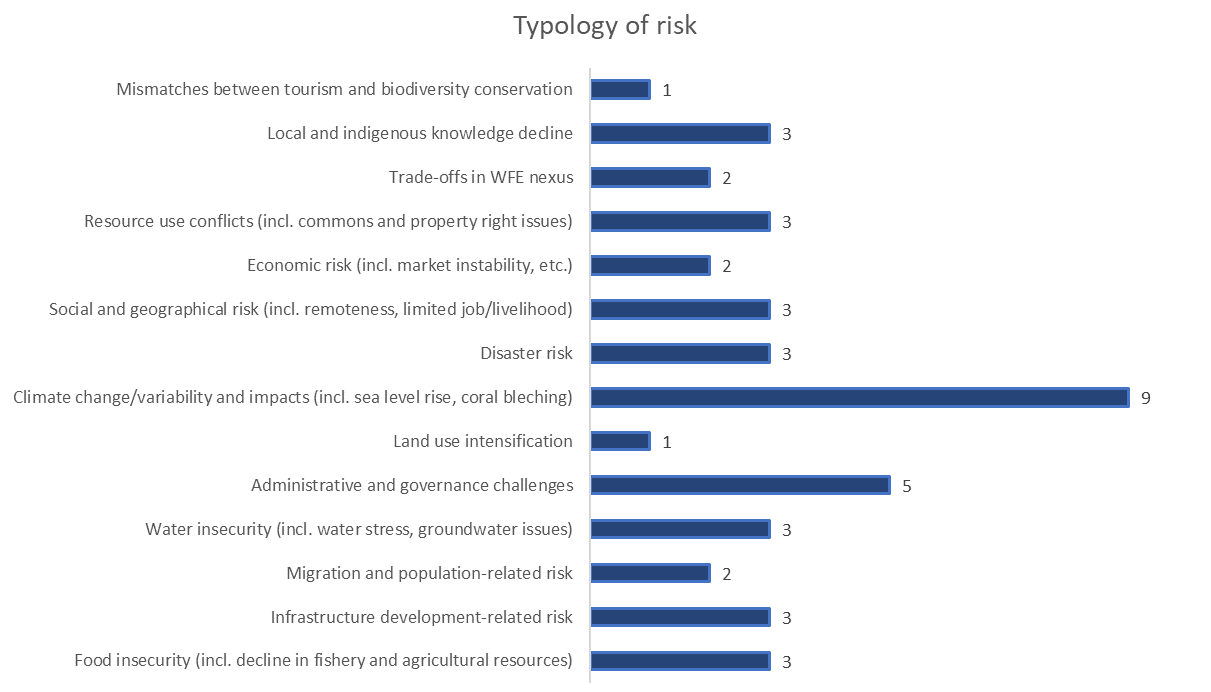
Co-occurrence analysis based on abstract
Similar with the key findings on AG dimensions (Figure 7), result of co-occurrence analysis of words in the abstract using KH Coder (Higuchi, 2016; Higuchi, 2017) reveals that most of the words/terms in the abstract indicate governance structure and framework dimension (red circle). Figure 14 below shows that management and governance of resources in islands are innate in the system but undertakes and process change in resource units, system units, management units and governance units. With climate constraining and enhancing the adaptive capacity of communities, social networks and capital could be instrumental particularly in local scale of governance. This also confirms the dimension of local capacity (blue circle) and how information and knowledge support local capacity and community practice (see Figure 7).
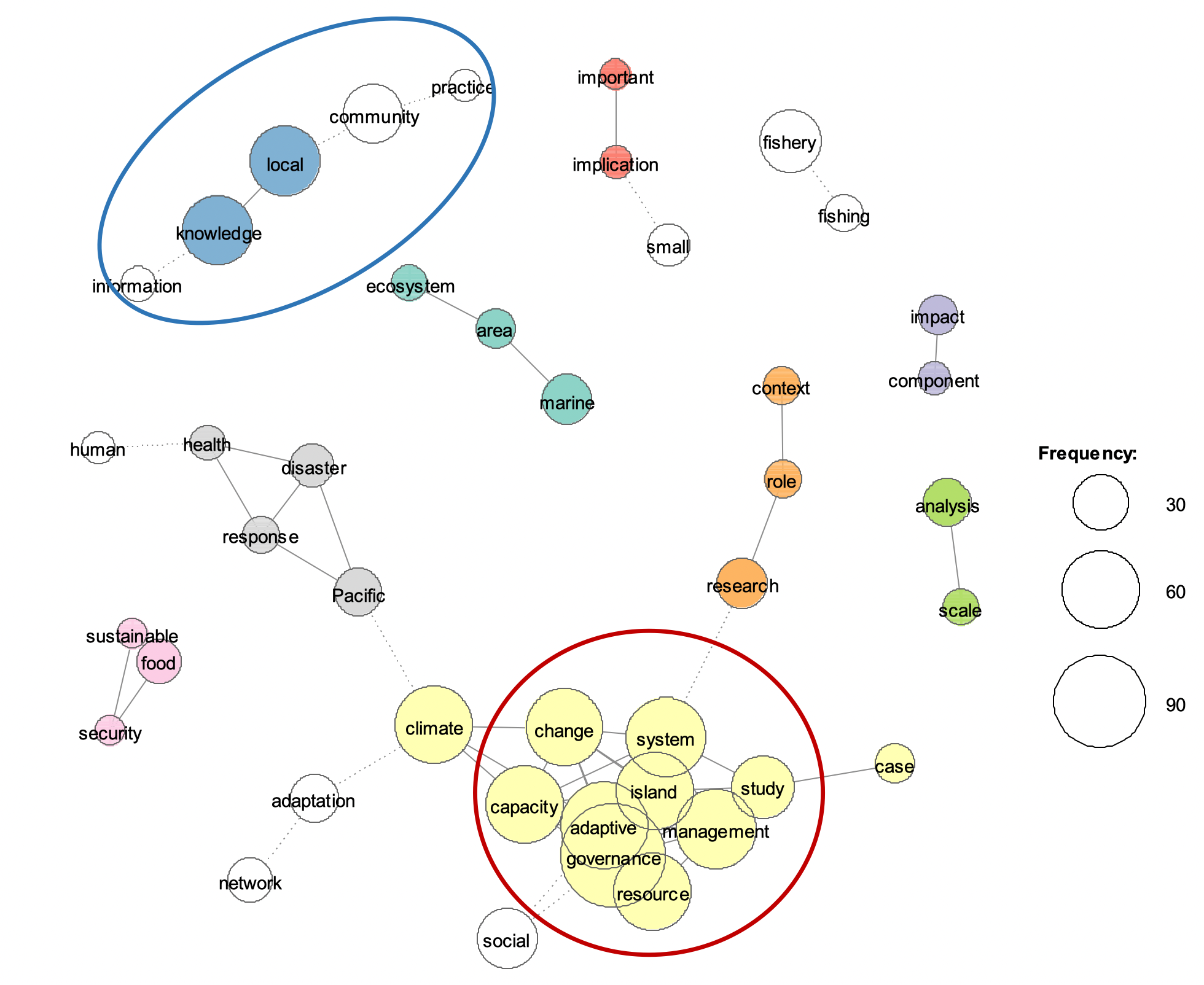
Discussion and Conclusion
Adaptive governance is considered an emergent form of environmental governance that coordinate resource management in the face of complexity and uncertainty (Chaffin, Gosnell and Cosens, 2014). Actors at multiple scales are key enabling factor of adaptive governance (Folke, 2005) and in the case of islands, the governance of resources seem to give this impression that it is easy and non-complex. Nonetheless, this is the opposite of what we have found in this review. In our review of stakeholder characterization, result shows the various actors (government, non-government, private, etc.) that are having their stake in governance and therefore, creating diverse set of interests, power, and responsibility. Small islands, due to their isolation (sea-boundedness), insularity and remoteness, are thought to have less access to regional resources and power and are disconnected from external opportunities. On the other hand, individuals residing in small islands are often depicted as resilient, an attribute to their strong social bonds and sense of connection within their communities. This resilience was formed due to the interplay of both physical and social thresholds as well environmental stresses and long-term interaction with nature.
In terms of theme distribution, there is a strong emphasis on adaptive governance, climate change, marine and coastal environments, and planning. It represents literature that addresses adaptive governance in the context of climate change, particularly in marine and coastal settings. Moreover, a focus on governance and management related to resources, with emphasis on adaptive systems, knowledge, and water is observed. Since this angle of governance of resources and ecosystems propose adaptive strategies in consideration of indigenous knowledge, this is applicable to island context and fundamentally highlight the importance of combining and co-producing different types of knowledge towards informed policymaking.
In the following part of this section, the answers for the research questions and the interpretations of findings are provided.
What are the cluster of research field/topics included in the research of AG? The four clusters found by the content analysis are: (1) island resource governance, (2) marine and coastal systems, (3) climate risk governance, and (4) land/user rights. Most of the papers addressed island resource governance and marine and coastal systems. It can be assumed that resources in islands are limited due to small physical carrying capacity and therefore, resources tend to have more conflicting demands and uses. Also, one AG principle manifested in the reviewed studies is having clear boundary. In this case, island being bounded by sea provides a good background of system boundary. Climate risk governance and land/user rights dimensions are also included in the clusters. In terms of climate risk governance, the focus is mainly climate risk and impact assessment and climate adaptation. These are related to building adaptive capacity to risks and hazards and measures and also cover human migration and relocation. But since local communities are very much connected to their living conditions and systems, until present, the issue of migration and relocation is still complicated. Hence, a more fit-for-purpose adaptive governance (Rijke, 2014) is of utmost importance given the complexity of the social implications. Land/user rights is also a critical aspect in islands especially in resolving dispute and conflict in resource use as well as mismatches in priorities between governments and local communities, but the priority of the research was concentrated to resource management because of the urgency and proximity of the interrelated issues and the need for development and strategies that deliver economic growth.
What is the scale(s) of the research/study? The scale of the study which is the most frequent based on the findings is the local scale. This is seconded by regional/transboundary scale, followed by subnational and national scales. This might imply that changes in the small island context is locally-observed by direct knowledge holders such as local communities who depend directly on the common island resources for their livelihood. Common pool resources are locally shared and distributed and needs local regulation of usage. To do so, what is needed is policy measures or governance systems which were evident in some papers reviewed (e.g., Fisheries Management Act of 2015 in Solomon Islands, Target Management Units or TMUs in Pico Island, Azores, and community-based governance of small-scale fisheries in Ngazidja island, Comoros). The regional/transboundary studies, on the other hand, mainly indicate existence of regional network, affinity and characteristics that are key in understanding island-wellbeing interactions in the context of relational and cultural dimensions. Overall, this points to the message that local resource management is a strategy for adapting to change (Turner-Walker, 2023). Given the increasing compound risks brought by environmental changes and the issue of resource scarcity, governance in small islands must be both innovative and responsive within the local context. in a such way that it enables ways to enhance local institutional strength and capacity to manage resources more effectively (i.e., collective governance of common pool resources as presented in a small-scale fishery case study in Hauzer, Dearden & Murray, et al., 2013).
What approaches (methodologies) were used/introduced in the research/study? The top four research methodologies which were employed include: Questionnaire survey, interview and group workshop, Mixed methods, Action research, and Scenario planning/analysis. As reported in some studies’ specific theme, social capital (i.e., knowledge and skills) enhances adaptive governance in islands and local perception is a common waypoint in discussing social capital and its influence in small island resilience. Social capital is measured through questionnaire survey since the indicators can only be actually validated or assessed through cognitive interviews and qualitative approaches (Ryan et al., 2012). Additionally, the use of mixed methods such as the quantitative story-telling and action research in data and narratives collection. These were proved effective not only in engaging the stakeholders but also in understanding and developing meanings around stakeholders’ experience and knowledge with social-ecological events and processes (Cabello et al., 2021).
What are the dimensions of AG in small islands which were discussed? The five dimensions of AG which were identified in the analysis, in order of frequency, are: (1) governance structure and framework dimension, (2) stakeholder capacity dimension; (3) planning and development dimension; (4) local and indigenous knowledge dimension; (5) law and policy dimension. These AG dimensions seem to validate that governance in small islands has great potential to operate across multiple levels with the sharing of decision-making power. This shared decision-making enables attending to context-specific issues shaped by local conditions (Ostrom; Hooghe et al., 2009). The varying local conditions and capacities can be assessed and integrated in a framing of governance tailored on the local needs, priorities, and institutional processes. Examples of framework identified in the review include the socio-ecological islandscape concept, commons governance, polycentricity, linked boundary functions concept or boundary-spanning, pathways approach, and resource mapping. Studies in stakeholder capacity dimension mostly focused on social capital and adaptation and how communities facing the increasingly complex changes manage vulnerability at multiple scales and build resilience. Knowledge co-production in community networks appears to be a new strategic response to climate change adaptation (in the case of lowland rice farmers in Bulukumba Regency, Indonesia as cited by Salman, 2023). This is related as well to the local and indigenous knowledge dimension whereby examples of the role of traditional knowledge in building adaptive capacities to climate change (Granderson, 2017) and the link between ecosystem-based management and common property regimes (Kahui & Richards, 2014) were underscored. In terms of planning and development dimension, nexus approaches were observed including that of water, food and energy (Serrano-Tovar, 2019) and scenario modelling towards achievement of future blue-food sufficiency (Teneva et al., 2023) and quantitative systems analysis of resources, resource units, governance systems, and users for small island management planning (Abrahamsz & Lopulalan, 2019).
What are the research gaps that are existing in the topic of “adaptive governance and islandness”? In an island setting, stakeholders/actors must rely on their social network and collective thinking (e.g., knowledge-exchange among agencies on coastal ecosystem management in Solomon Islands as cited by Cohen, et al, 2012). Despite that, geographic, logistical, and institutional barriers and tradeoffs to multi-actor and cross-scale coordination should be examined and existing exchange and linkages should also be extended within and beyond the region. This aspect is yet to be explored. Additionally, topics that focus on features of islandness including that of being a natural laboratory relevant for theoretical, cultural, and philosophical reasons are not widely-researched. For instance, the impact of tourism on island resources such as water (Skrimizea & Parra, 2020) and influence on the island’s economic and development framework (McNaught et al, 2022) can be co-envisioned and co-assessed and by referring to the concept of island as a natural laboratory for the observation and experimentation. In the future, more of this kind of co-learning mechanisms is needed for in-depth investigation of the trade-offs and mismatches between conservation and development.
This paper summarizes the forms of AG research in small islands, the different types of ecosystems the research is connected to, and the scale/level of research conduct/practice. It shows the range of methodologies used that covers AG research in small islands and the different forms and levels of governance mechanisms as well. It concludes the broad characteristics of adaptive governance in small islands (from the definition of islandness) that span the domains of social-ecological systems. The study’s findings suggest that studies on AG in small islands exist mostly in oceanic islands which means that they might have been remote geographically being surrounded by sea and not situated or attached to any continental shelf. The review also suggests that although five dimensions of adaptive governance were identified (as in Figure 5), none of the current papers is fully covering dynamics of cross-scale interactions particularly in the human institutional system. More research is needed on clarifying how diverse set of actors and capacities can effectively support transition to and implementation of adaptive governance in multiple scales and processes. Furthermore, the study revealed that climate change, as the dominant type of risk, remains to be the key driver of change in small islands. Further research is needed on assessing the specific climate change risks and hazards and on accurately predicting future climate change-related impacts that may be faced by communities in islands. Developing and applying future-thinking methods such as uncertainty analysis and scenario planning, coupled with associated cause-and-effect interactions and cross-scale processes, is suggested. For example, the mapping the dynamics of a shared resource (e.g. groundwater in the case of Karthiga, et al., 2023) could be a first step in the whole iterative process of participatory future-thinking and it should be collaborative, evidence-based, and context-sensitive to strongly influence stakeholder behavior and decision-making.
This research confirms the importance of local context in adaptive governance research and emphasizes that management and conservation decisions in islands are evidently shaped by conditions of high variability, uncertainty and environmental and social changes. In addition, since the measures of isolation and the interaction between and among islands are also crucial elements in the study of adaptive governance in small islands, it put into limelight the role regional organizations can take in furthering resilient and adaptive pathways towards AG and sustainable transformations. Recently, increased attention is growing on the governance needed to address the UN 2030 Agenda Sustainable Development Goals (SDGs) in SIDS by means of the Small Island Developing States Accelerated Modalities of Action Pathway or the SAMOA Pathway. This direction requires transformative policy change, participation and collective action, policy coherence, reflexivity, adaptation and democratic institutions (Glass & Newig, 2019). This can enable a more cross-sectoral and crosscutting practice of adaptive governance in islands.
Conflict of Interest
Authors declare no conflict of interests.
Acknowledgements
This paper was compiled as a collaborative output of the discussions and activities by the LINKAGE project (Project No. RIHN14200145) of the Research Institute for Humanity and Nature (RIHN), Japan: https://www.chikyu.ac.jp/rihn_e/activities/project/project/12/. This paper was published after the editor conducted a review of formatting and prescribed house styles.
References
- Abrahamsz, J., & Lopulalan, Y., 2019. Social-ecological system status and its implications for coastal and small islands management planning in Tanimbar Islands, Maluku Province, Indonesia. In IOP Conference Series: Earth and Environmental Science (Vol. 348, No. 1, p. 012137). IOP Publishing. doi:10.1088/1755-1315/348/1/012137
- Altschuler, B., & Brownlee, M., 2016. Perceptions of climate change on the Island of Providencia. Local Environment, 21(5), 615-635. doi:10.1080/13549839.2015.1004165
- Bennett, N. J., & Dearden, P., 2014. From measuring outcomes to providing inputs: Governance, management, and local development for more effective marine protected areas. Marine Policy, 50, 96-110. doi:10.1016/j.marpol.2014.05.005
- Bouchet, L., Thoms, M. C., & Parsons, M., 2019. Groundwater as a social-ecological system: A framework for managing groundwater in Pacific Small Island Developing States. Groundwater for Sustainable Development, 8, 579-589. doi:10.1016/j.gsd.2019.02.008
- Cabello, V., Romero, D., Musicki, A., Guimarães Pereira, Â., & Peñate, B., 2021. Co-creating narratives for WEF nexus governance: A Quantitative Story-Telling case study in the Canary Islands. Sustainability Science, 16, 1363-1374. doi:10.1007/s11625-021-00933-y
- Cohen, P. J., Evans, L. S., & Mills, M., 2012. Social networks supporting governance of coastal ecosystems in Solomon Islands. Conservation Letters, 5(5), 376-386. doi:10.1111/j.1755-263X.2012.00255.x
- Das, J., Kabir, M. H., Taimur, F. M., Hossain, M., & Kumar, U., 2022. Evaluating governability challenges of Saint Martin’s Island (SMI) in Bangladesh. World Development Perspectives, 27, 100434. doi:10.1016/j.wdp.2022.100434
- Datta, A. W., & Chaffin, B. C., 2022. Evolving adaptive governance: challenging assumptions through an examination of fisheries law in Solomon Islands. Ecology and Society, 27. doi:10.5751/ES-13251-270230
- del Cristo Monagas, M., & Corral, S., 2022. Should Western renewable energy microgrids be exported to African islands? Exploring governance, village experiences, and sociotechnical challenges in Cape Verde. Energy Research & Social Science, 93, 102830. doi:10.1016/j.erss.2022.102830
- Dunning, K. H., 2021. Adaptive Governance: The proposed port expansion in the Cayman Islands and its impacts to coral reefs. Marine Policy, 124, 104248. doi:10.1016/j.marpol.2020.104248
- Ebel, S. A., 2020. Moving beyond co-management: Opportunities and limitations for enabling transitions to polycentric governance in chile’s territorial user rights in fisheries policy. International Journal of the Commons, 14(1). doi:10.5334/ijc.998
- Ellefsen, H., & Bromley, D. W., 2021. The quest for fisheries governance: Lessons from the Faroe Islands. Elem Sci Anth, 9(1), 00115. doi:10.1525/elementa.2020.00115
- Eurich, J. G., Tekiau, A., Seto, K. L., Aram, E., Beiateuea, T., Golden, C. D., ... & McCauley, D. J., 2023. Resilience of a giant clam subsistence fishery in Kiribati to climate change. Pacific Conservation Biology. doi:10.1071/PC22050
- Fernandes, J. P., Freire, M., Guiomar, N., & Gil, A., 2017. Using modeling tools for implementing feasible land use and nature conservation governance systems in small islands–The Pico Island (Azores) case-study. Journal of Environmental Management, 189, 1-13. doi:10.1016/j.jenvman.2016.12.034
- Fernandes, R., & Pinho, P., 2017. The distinctive nature of spatial development on small islands. Progress in Planning, 112, 1-18.
- Fitzpatrick, D., & Monson, R., 2022. Property rights and climate migration: Adaptive governance in the South Pacific. Regulation & Governance, 16(2), 519-535. doi:10.1111/rego.12365
- Foley, A. M., 2018. Climate impact assessment and “islandness” Challenges and opportunities of knowledge production and decision-making for Small Island Developing States. International Journal of Climate Change Strategies and Management, 10(2), 289-302.
- Fudge, M., & Hiruy, K., 2019. Linked boundary functions: examining the role of ‘research for development’organizations in integrating levels of resource governance. Society & Natural Resources, 32(3), 255-274. doi:10.1080/08941920.2018.1517914
- Gero, A., Fletcher, S., Rumsey, M., Thiessen, J., Kuruppu, N., Buchan, J., ... & Willetts, J., 2015. Disasters and climate change in the Pacific: adaptive capacity of humanitarian response organizations. Climate and Development, 7(1), 35-46. doi:10.1080/17565529.2014.899888
- Glass, L. M., & Newig, J. (2019). Governance for achieving the Sustainable Development Goals: How important are participation, policy coherence, reflexivity, adaptation and democratic institutions?. Earth System Governance, 2, 100031.
- Granderson, A. A., 2017. The role of traditional knowledge in building adaptive capacity for climate change: Perspectives from Vanuatu. Weather, Climate, and Society, 9(3), 545-561. doi:10.1175/WCAS-D-16-0094.1
- Greenhill, L., Stojanovic, T. A., & Tett, P., 2020. Does marine planning enable progress towards adaptive governance in marine systems? Lessons from Scotland’s regional marine planning process. Maritime Studies, 19, 299-315. doi:10.1007/s40152-020-00171-5
- Higuchi, K., 2016. A Two-Step Approach to Quantitative Content Analysis: KH Coder Tutorial Using Anne of Green Gables (Part I), Ritsumeikan Social Science Review, 52(3): 77-91
- Higuchi, K., 2017. A Two-Step Approach to Quantitative Content Analysis: KH Coder Tutorial Using Anne of Green Gables (Part II), Ritsumeikan Social Science Review, 53(1): 137-147
- Hogarth, J. R., & Wójcik, D., 2016. An evolutionary approach to adaptive capacity assessment: a case study of Soufriere, Saint Lucia. Sustainability, 8(3), 228. doi:10.3390/su8030228
- IPCC 2022. Chapter Authors: Mycoo, M., Wairiu, M., Campbell, D., Duvat, V., Golbuu, Y., Maharaj, S., ... & Warrick, O. Small islands. IPCC WGII Sixth Assessment Report.
- Jaja, J., Dawson, J., & Gaudet, J., 2017. Using Social Network Analysis to examine the role that institutional integration plays in community-based adaptive capacity to climate change in Caribbean small island communities. Local Environment, 22(4), 424-442. doi:10.1080/13549839.2016.1213711
- Kahui, V., & Richards, A. C., 2014. Lessons from resource management by indigenous Maori in New Zealand: governing the ecosystems as a commons. Ecological Economics, 102, 1-7. doi:10.1016/j.ecolecon.2014.03.006
- Karthiga, I., Rameshwaran, P., Ketheesan, B., & Sriskandarajah, N., 2023. Groundwater mapping and locally engaged water governance in a small island terrain: Case study of Karainagar island, Northern Sri Lanka. World Water Policy, 9(3), 456-480. doi:10.1002/wwp2.12112
- Keegan, W. F., Fitzpatrick, S. M., Sullivan Sealey, K., LeFebvre, M. J., & Sinelli, P. T., 2008. The role of small islands in marine subsistence strategies: Case studies from the Caribbean. Human ecology, 36, 635-654.
- Kelman, I., 2020. Islands of vulnerability and resilience: Manufactured stereotypes?. Area, 52(1), 6-13.
- Lauer, M., Albert, S., Aswani, S., Halpern, B. S., Campanella, L., & La Rose, D., 2013. Globalization, Pacific Islands, and the paradox of resilience. Global Environmental Change, 23(1), 40-50. doi:10.1016/j.gloenvcha.2012.10.011
- Lynch, A. H., & Brunner, R. D., 2010. Learning from climate variability: adaptive governance and the Pacific ENSO applications center. Weather, Climate, and Society, 2(4), 311-319. doi:10.1175/2010WCAS1049.1
- McConney, P., Cox, S. A., & Parsram, K., 2015. Building food security and resilience into fisheries governance in the Eastern Caribbean. Regional Environmental Change, 15(7), 1355-1365. doi:10.1007/s10113-014-0703-z
- Mouillot, D., Velez, L., Maire, E., Masson, A., Hicks, C. C., Moloney, J., & Troussellier, M., 2020. Global correlates of terrestrial and marine coverage by protected areas on islands. Nature Communications, 11(1), 4438.
- Nel, R., Mearns, K. F., Jordaan, M., & Goethals, P., 2021. Towards understanding the role of islandness in shaping socio-ecological systems on SIDS: The socio-ecological islandscape concept. Ecological Informatics, 62, 101264. doi:10.1016/j.ecoinf.2021.101264
- Parsons, M., Brown, C., Nalau, J., & Fisher, K., 2018. Assessing adaptive capacity and adaptation: Insights from Samoan tourism operators. Climate and Development, 10(7), 644-663. doi:10.1080/17565529.2017.1410082
- Pittman, J., Armitage, D., Alexander, S., Campbell, D., & Alleyne, M., 2015. Governance fit for climate change in a Caribbean coastal-marine context. Marine Policy, 51, 486-498. doi:10.1016/j.marpol.2014.08.009
- Rumsey, M., Fletcher, S. M., Thiessen, J., Gero, A., Kuruppu, N., Daly, J., ... & Willetts, J., 2014. A qualitative examination of the health workforce needs during climate change disaster response in Pacific Island Countries. Human Resources for Health, 12, 1-11. doi:10.1186/1478-4491-12-9
- Serrano-Tovar, T., Suárez, B. P., Musicki, A., de la Fuente Bencomo, J. A., Cabello, V., & Giampietro, M., 2019. Structuring an integrated water-energy-food nexus assessment of a local wind energy desalination system for irrigation. Science of the total environment, 689, 945-957. doi:10.1016/j.scitotenv.2019.06.422
- Sheng, R., & Lin, T., 2019. Evolutionary Assessment of the Ecological Governance under the Metropolitan Background: Evidence from Chongming Eco-Island, Shanghai, China. Sustainability, 11(19), 5327. doi:10.3390/su11195327
- Siegel, K. J., Cabral, R. B., McHenry, J., Ojea, E., Owashi, B., & Lester, S. E., 2019. Sovereign states in the Caribbean have lower social-ecological vulnerability to coral bleaching than overseas territories. Proceedings of the Royal Society B, 286(1897), 20182365. doi:10.1098/rspb.2018.2365
- Skrimizea, E., & Parra, C., 2020. An adaptation pathways approach to water management and governance of tourist islands: The example of the Southern Aegean Region in Greece. Water International, 45(7-8), 746-764. doi:10.1080/02508060.2020.1791683
- Teneva, L., Free, C. M., Hume, A., Agostini, V. N., Klein, C. J., Watson, R. A., & Gaines, S. D., 2023. Small island nations can achieve food security benefits through climate-adaptive blue food governance by 2050. Marine Policy, 151, 105577. doi:10.1016/j.marpol.2023.105577
- Weigelt, P., & Kreft, H., 2013. Quantifying island isolation–insights from global patterns of insular plant species richness. Ecography, 36(4), 417-429.
- Wongbusarakum, S., Gorstein, M., Pomeroy, R., Anderson, C. L., & Mawyer, A., 2021. Mobilizing for change: assessing social adaptive capacity in Micronesian fishing communities. Marine Policy, 129, 104508. doi:10.1016/j.marpol.2021.104508
